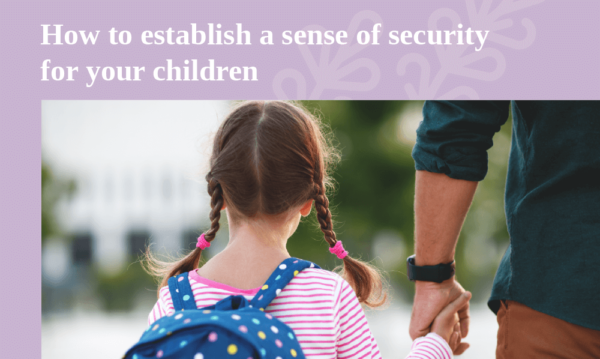What does safety mean for each of us and, by extension, for a small child? Indeed, the knowledge that there is a roof, a plate of food, and a bed for rest and sleep, contribute to security’s primary experience. That is, the child should know that his vital needs are met before he even seeks them.
Apart from these essential safety elements, the child needs to experience stability and calm in his life and be surrounded by people who show him unconditional love and acceptance, only because he exists, he is a unique, lovable creature. All this contributes to establishing in children emotional and mental balance.
How to help children feel safe:
1. Establish a routine in your daily activities, whether they are infants or primary school children. It is good to have stability in the caregivers, the schedule you follow, and the different places you go. In other words, the child must know that, for example, mom takes it to school, Grandma picks it up, in the afternoons, he will spend time in the playground with Dad, and before he goes to sleep, he will read two fairy tales with Mom.
2. Inform in time (e.g., the evening of the previous day or the morning of the same day) about the small changes that will happen in the daily schedule, e.g., Mom will have to visit a doctor. For tomorrow only dad will pick up the child from school or have lunch at Grandma’s house because Mom and Dad will have an appointment.
3. Inform in advance about significant changes that are going to happen (e.g., “Mom will go to the hospital to give birth to your little brother,” “We will change house, we will stay in a larger house where you will have your room,” “Grandma will stay with us,” “Mom will start working and will be gone 5 hours in the mornings when you will stay at Grandma’s house” and so on). This information needs to be given regardless of the ages of the children. Even if they do not understand exactly what you are saying, babies need to know that there will be a change in their daily routine, schedule, or primary care. He can communicate; you can encourage him to express his thoughts and feelings about the upcoming change. In announcing essential changes, fairy tales of a variety of themes can also help.
4. When you put the kids to bed, talk about the next day’s schedule, even if it’s the same as the day that passed. The knowledge of “what will happen tomorrow” helps children to leave themselves calmer and more peaceful to sleep. This technique is beneficial for children who are scared at night and do not want their game and day to end.
Children who experience safety in all aspects of their lives are happier, emotionally and mentally healthy, and adapt more quickly to any change in their lives. Children who feel safe living in a familiar and stable environment flourish, believe in their powers, spread their wings, and evolve. Security is experienced first internally and then externally and is one of the most critical pillars in the evolution and formation of the individual’s personality.
Niki Lioti was born and lives in Thessaloniki, completed her studies at the Department of Psychology of the Aristotle University of Thessaloniki and has specialized in Systemic Family Psychotherapy.
Menu
Menu
Useful Links
Opening Hours
Daily
4:00 pm - 9:00 pm
Weekend
Closed
Copyright © Νίκη Λιώτη 2021 | Powered by Cactus


